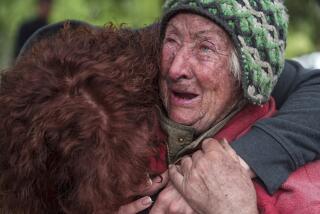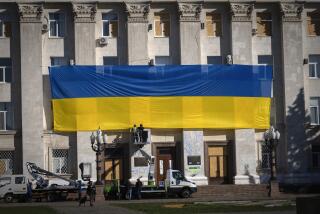Yeltsin Claims Defeat of Chechen Gunmen
- Share via
TERECHNOYE, Russia — After hurling the full wrath of the Russian military arsenal at the tiny southern Russian village Pervomayskaya for four days, President Boris N. Yeltsin declared Thursday that Chechen gunmen holding more than 100 hostages have been annihilated and most of their captives freed.
But the president’s boast that federal forces bombarding the desolate target in the Republic of Dagestan had taught Chechen terrorists “a profound lesson,” and his vow to wipe out the last nests of resistance in neighboring Chechnya, glossed over the grim reality of a 10-day-old hostage crisis that has humiliated the Kremlin.
Muslim guerrillas supporting the Chechens continued Thursday to hold a Black Sea ferry and its passengers and crew captive and were steaming toward the Turkish port of Istanbul in the vessel rigged with explosives.
Despite Yeltsin’s proclamation of victory over the Chechen rebels, gunfire still echoed in Pervomayskaya, suggesting that federal forces had not fully subdued surviving gunmen.
Yeltsin’s prime minister, Viktor S. Chernomyrdin, issued a statement shortly before the president’s, conceding that most captives in Pervomayskaya are probably dead.
Even the Federal Security Service directing the antiterrorism operation that has deployed nearly 10,000 troops here acknowledged that the Chechen gunmen were still numerous enough after thunderous bombardments to stage a breakout attempt before dawn.
About 70 Chechen survivors of the Pervomayskaya assault tried to pierce the western flank of federal troops surrounding the village and were either killed or driven back into their ruined refuge during a three-hour battle, Federal Security Service spokesman Alexander Zdanovich was quoted as saying by the Itar-Tass news agency.
Another group of Chechen guerrillas apparently trying to aid the Pervomayskaya holdouts simultaneously invaded the nearby village of Sovetskaya early Thursday, sending hundreds of peasants there and from adjacent Terechnoye fleeing in panic in a blizzard.
Because journalists who earlier watched the Russian assault from an embankment a mile away have been driven off the vantage point between Sovetskaya and Terechnoye by federal forces, it was impossible to confirm the government’s claims.
Meanwhile, the Kremlin’s conflict with Chechens loyal to rebel leader Dzhokar M. Dudayev spilled deeper into the international arena as the ferry commandeered by Chechen allies was expected to reach Istanbul today.
The drama on board the Avraziya, carrying 144 passengers and 55 crew members, was expected to reach a climax once the hijackers attempt to put into port and hold a news conference to condemn Russia’s war against Chechnya.
The gunmen seemed overtaken by events in Dagestan, apparently succumbing to pressure from Turkish authorities and Dudayev to retract their threats to blow up the ferry to dramatize Chechnya’s plight.
Turkish Prime Minister Tansu Ciller said security forces opposed allowing the Avraziya passage through the Bosporus Strait because of the explosives it was carrying. But the 3,800-ton ferry, hijacked late Tuesday, was still moving toward Istanbul despite that warning.
Yeltsin’s declaration of a successful conclusion to the hostage ordeal in Dagestan was made in a statement to Russian media at the Kremlin, and contended that 82 of the captives originally grabbed by the Chechens in the Russian town of Kizlyar had been freed. He said that 18 hostages were unaccounted for and that all of the gunmen were dead.
“The Pervomayskaya operation has been completed, with minimal losses among the hostages and our forces,” Yeltsin said in the televised statement.
He said 26 government soldiers had been killed in the operation, and that a search would be carried out for other hostages who might have survived.
“The bandits are all exterminated, unless somebody hid underground,” Yeltsin announced, leaving open the possibility that some of the gunmen--thought to number 300 originally--could be waiting to ambush Russian infantry from their network of trenches.
Russian soldiers shuttling wounded out of Pervomayskaya during the first three days of the artillery siege told journalists that the Chechens had survived initial bombardment by digging caves under the thick concrete foundations of farm buildings.
Indications that Dudayev’s guerrillas were still resisting despite a punishing four-day assault cast suspicion on Yeltsin’s claims that the operation was over.
There has also been little corroborating evidence that so many of the civilian hostages the rebels were using as human shields were able to escape the deadly melee.
Russian television showed footage of at least a dozen smoldering bodies of Chechen rebels strewn in trenches and gullies and flanked by crates of ammunition. The origin of the videotape was not clear, and the flat, open fields in which the corpses were arrayed appeared to be outside what had been the populated center of the village.
All day Wednesday and early Thursday, the government forces surrounding Pervomayskaya rocketed the rubble of the town with 10-foot-long Grad missiles fired in volleys as intense as 16 in one staccato blast.
Yeltsin hinted that the campaign to complete the military suppression of Chechen independence claims would follow soon after Pervomayskaya was under control.
“We have taught Dudayev a profound lesson,” said the 64-year-old president, who has toughened his stance toward Chechnya since the hostage incident began Jan. 9. “Now we have to render blows on Dudayev’s bases, where there are no civilians, in order to put an end to Chechen terrorism on Russian soil. It has already spread to Turkey. We cannot tolerate this any longer.”
The Interior Ministry, from which most of the troops surrounding Pervomayskaya were deployed, reported that 60 Chechens died in the four-day battle. It made no mention of the likely fate of the others, but villagers throughout the region said they thought some of the gunmen managed to escape.
Times staff writer Richard Boudreaux in Moscow and special correspondent Hugh Pope in Istanbul contributed to this report.
More to Read
Sign up for Essential California
The most important California stories and recommendations in your inbox every morning.
You may occasionally receive promotional content from the Los Angeles Times.














